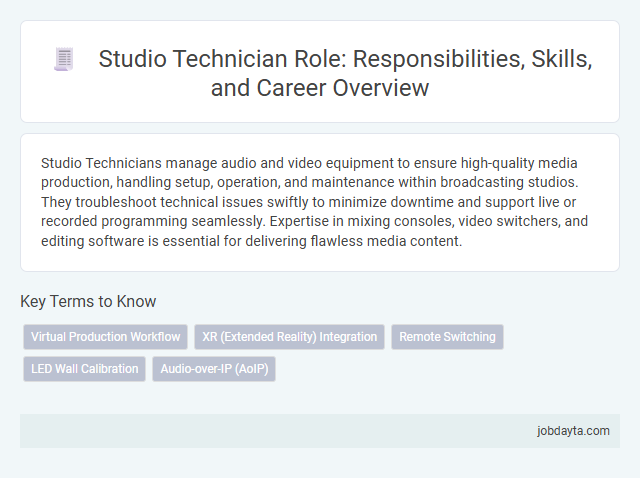Studio Technicians manage audio and video equipment to ensure high-quality media production, handling setup, operation, and maintenance within broadcasting studios. They troubleshoot technical issues swiftly to minimize downtime and support live or recorded programming seamlessly. Expertise in mixing consoles, video switchers, and editing software is essential for delivering flawless media content.
Introduction to the Studio Technician Role
A Studio Technician plays a vital role in the media production environment, responsible for setting up, operating, and maintaining audio and video equipment. This role ensures seamless broadcasting, recording, and live event production by troubleshooting technical issues in real-time. Studio Technicians collaborate with producers, directors, and other media professionals to deliver high-quality content efficiently.
Key Responsibilities of a Studio Technician
A Studio Technician plays a crucial role in the media production environment by managing and maintaining technical equipment. They ensure all audiovisual systems operate smoothly during broadcasts and recordings.
Key responsibilities include setting up and testing cameras, microphones, lighting, and sound equipment. They troubleshoot technical issues promptly to avoid disruptions in live or recorded sessions. Studio Technicians also collaborate closely with producers and directors to meet specific production requirements and maintain high-quality media output.
Essential Technical Skills for Studio Technicians
Studio Technicians must master audio and video equipment setup, ensuring flawless signal flow for live broadcasts and recordings. Proficiency in mixing consoles, cameras, and lighting systems is critical to deliver high-quality media production.
Expertise in troubleshooting hardware and software issues minimizes downtime during studio operations. Knowledge of digital editing tools and media formats enhances efficiency in post-production workflows.
Required Soft Skills and Personal Attributes
A Studio Technician plays a crucial role in ensuring smooth media production by managing technical equipment and supporting live broadcasts. Your ability to communicate efficiently and solve problems quickly enhances overall studio performance.
- Effective Communication - Clearly conveying technical information helps maintain seamless collaboration with team members and talent.
- Adaptability - Adjusting promptly to changing situations and technical challenges ensures continuous production flow.
- Attention to Detail - Carefully monitoring equipment and signals prevents errors and maintains high-quality output.
Educational Background and Certifications
| Educational Background | Certifications |
|---|---|
|
|
Daily Workflow in a Studio Environment
Studio Technicians play a critical role in ensuring smooth operations within a media studio environment. They manage technical equipment and support production staff to maintain high-quality outputs daily.
- Equipment Setup and Maintenance - You are responsible for setting up, testing, and troubleshooting audio, video, and lighting equipment before and during recordings.
- Signal Monitoring and Quality Control - Continuous monitoring of signal flows and sound levels ensures broadcast quality meets professional standards.
- Technical Support During Productions - Providing immediate technical assistance helps prevent disruptions and enables seamless live or recorded sessions.
Mastering these daily tasks enhances efficiency and reliability in a fast-paced studio setting.
Common Equipment and Software Used
Studio Technicians operate essential equipment such as mixing consoles, lighting panels, and audio interfaces. These tools ensure high-quality sound and visual production during live broadcasts and recordings.
Software like Pro Tools, Adobe Audition, and OBS Studio are commonly used to edit, mix, and stream content efficiently. Your proficiency with these technologies enhances the overall production quality and workflow in any media studio.
Career Progression and Opportunities
What career progression opportunities exist for a Studio Technician in the media industry? Studio Technicians can advance to roles such as Broadcast Engineer, Technical Director, or Production Manager by gaining specialized skills and experience. Continuous learning and certifications in audio-visual technology enhance your prospects for leadership positions and higher salaries.
Challenges Faced by Studio Technicians
Studio technicians play a vital role in the seamless production of media content. Your work environment presents unique challenges that require technical expertise and quick problem-solving skills.
- Technical Malfunctions - Equipment failures demand immediate troubleshooting to avoid disrupting live broadcasts or recordings.
- Tight Deadlines - Rapid setup and adjustments are essential to meet strict production schedules.
- Complex Equipment Integration - Managing and synchronizing multiple audio-visual systems requires advanced knowledge and precision.
Tips for Aspiring Studio Technicians
Studio technicians play a crucial role in managing audio and video equipment during recordings and broadcasts. Aspiring studio technicians should develop strong technical skills in sound engineering, lighting, and video editing software. Gaining hands-on experience through internships and maintaining attention to detail ensures success in this dynamic media profession.
Related Important Terms
Virtual Production Workflow
Studio Technicians specializing in Virtual Production Workflow utilize real-time rendering engines and LED volume technology to seamlessly integrate live-action footage with computer-generated environments. Mastery of camera tracking systems, virtual set management, and real-time compositing ensures efficient coordination between technical teams and creative directors for immersive media production.
XR (Extended Reality) Integration
Studio Technicians specializing in XR integration expertly manage immersive technologies such as augmented reality (AR), virtual reality (VR), and mixed reality (MR) to enhance media production workflows and broadcast experiences. Their responsibilities include real-time rendering optimization, sensor calibration, and seamless synchronization of XR content with live studio environments, ensuring high-quality virtual set execution and audience engagement.
Remote Switching
Studio Technicians specializing in Remote Switching expertly manage live broadcast feeds from multiple locations, ensuring seamless transitions and signal integrity. Their technical proficiency with video routers, switchers, and communication systems is critical for high-quality, real-time media production.
LED Wall Calibration
Studio Technicians specializing in LED wall calibration ensure precise color accuracy and brightness levels by utilizing advanced calibration tools and software, enhancing the visual quality of broadcast and production environments. Their expertise maintains consistent display performance across various lighting conditions, critical for live studio shoots and virtual set integrations.
Audio-over-IP (AoIP)
Studio Technicians specializing in Audio-over-IP (AoIP) manage the setup, configuration, and maintenance of networked audio systems to ensure seamless, high-quality sound transmission across broadcast environments. Expertise in protocols such as Dante, AES67, and RAVENNA enables efficient audio routing, low-latency performance, and interoperability among various digital audio devices in professional media studios.
Studio Technician Infographic

 jobdayta.com
jobdayta.com